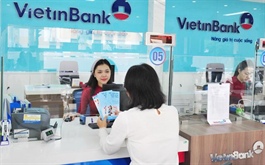Developers seeking further support in approaching loans
Developers seeking further support in approaching loans
Many real estate businesses are concerned about the feasibility of approaching loans despite the State Bank of Vietnam increasing the credit room, simultaneously requiring commercial banks to reduce payable interest.

Just a short time after the State Bank of Vietnam (SBV) issued the decision to increase the credit room by 1.5-2 per cent for growth in 2022 and introduced liquidity measures to banks, 16 lenders have committed to reducing payable interest for businesses. They combine the big four banks of Agribank, Vietcombank, VietinBank, and BIDV along with smaller groups such as SHB, HDBank, and SeABank.
The credit room rise will allow an amount of VND350-400 trillion ($15.2-17.4 billion) to be added to the market in the last three weeks of 2022. Besides that, according to banks’ commitment, they will lower interest by 0.5-3 percentage points per year with an amount of around VND3.5 trillion ($152.2 million) to support businesses.
Real estate businesses are concerned about the feasibility of approaching loans, Photo: Le Toan
The major borrowers of these banks are businesses operating in prioritised industries, import-export sectors, foreign-invested firms, and those affected by the COVID-19 pandemic, as well as businesses producing necessities.
The adjusted interest rates will be applied flexibly by banks. For example, at Agribank, the rates for outstanding loans in VND taken out before November 30 have been reduced by 20 per cent. Meanwhile, borrowers will enjoy an interest subsidy of up to 20 per cent for loans given out in December.
ACB has slashed lending rates by one percentage point for clients taking out loans from December 6 to the end of January 2023, while SHB is offering an interest subsidy of 1.5-2 percentage points for borrowers operating in prioritised sectors and businesses producing necessities.
Responding to these moves, Nguyen Manh Linh, deputy director of Dai Phong JSC – a company that invests in many sectors, including real estate – told VIR, “These moves, especially the extension of the credit room, are extremely important policies for businesses at this time, especially small- and medium-sized ones.”
Linh says the credit room extension is much more important than a decrease in payable interest rate as his company and even many of its partners face difficulties in approaching credit loans because almost the banks have been running out of room.
In addition, some banks temporarily stopped providing loans to the real estate sector in the short term, in the wake of the SBV policy on controlling credit growth in risky areas.
“At the time, we had to get dollar loans with a payable interest rate of 30 per cent to have the capital to develop unfinished projects, to maintain production activity, and simply have money to pay salaries for employees. Companies accept loans with high interest as long as banks have abundant capital for us instead of tightening the credit room,” Linh said.
Nguyen Van Dinh, vice chairman of the Vietnam Real Estate Association and chairman of the Vietnam Association of Realtors said, “Banks are allowed to extend the room of 2-3 per cent each and this extension is not only offered for the real estate sector. Meanwhile, the demand on capital of real estate developers is massive. Thus, this adjustment may make nothing of the demand from property businesses.”
In addition, at a seminar on removing difficulties in capital for businesses held in Ho Chi Minh City on December 13, representatives of commercial banks said that they have to carefully appraise a business before providing loans for them to ensure efficiency and safety.
“In some cases, although banks want to provide loans, enterprises run out of money due to difficulties in recovering the debts and mobilising deposits at the year-end time,” Linh of Dai Phong JSC said.
According to statistics collected from 26 banks listed on stock exchanges (excluding Agribank, BaoVietBank, and SCB) as of the end of the third quarter, the total deposit volume mobilised from organisations and individual customers was VND7.72 quadrillion ($335.65 billion), up 4 per cent on-year. Meanwhile, these banks provided total loans of VND8.17 quadrillion ($355.2 billion), up 12.4 per cent on-year.
Nguyen Quoc Hung, general secretary of the Vietnam Banks Association said, “The outstanding credit is equal to the total deposit. In addition, the deposit volume is lower than the loans, thus even if the SBV loosens the credit ceiling, commercial banks do not have enough capital for more loans.”






















